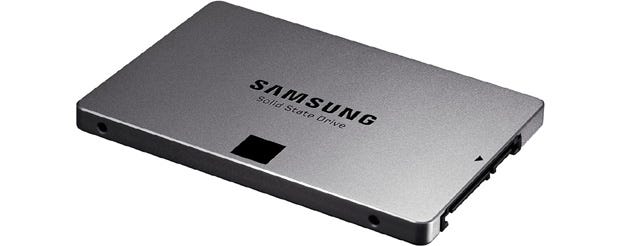Week In Tech: Are SSDs Really Reliable?
Oh hell, it's happened again. But this time it's induced not only frustration but a sudden pang of guilt. Another of my SSDs has gone titsup.com and my borderline breathless fanboyism for SSDs is flashing before my eyes. What have I done? Have I been wrong all along? Are SSDs still not fit for public consumption? At the very least, it's reason enough to re-examine just how reliable the latest solid staters are and whether the reward is worth the risk.
My latest offender is a Crucial C300. A couple of generations old, perhaps, but very much a modern SSD complete with TRIM support.
More importantly, this drive had until recently led a pretty pampered life. It was one of my test drives that was woken up once or twice a month to benchmark a motherboard, GPU or whatever - unlike the previous failure involving a Kingston SSDNow effort of similar vintage that wilted under the onslaught of some heavy duty torrenting.
The irony here is that I pressed the C300 into regular duty in one of my secondary PCs on the back of the Kingston's failure. To be fair, the C300 hasn't totally died and I haven't gotten properly stuck into the trouble shooting yet. But it has started locking up horribly on occasion. Not good.
Good company
I could simply view myself as being in good company. Last year, Linus Torvald's SSD reportedly screwed the pooch, bringing development of the Linux 3.12 kernel to a standstill.
Of course, the real difficulty here is getting hold of proper stats with decent sample sizes based on a well-designed survey from an independent source. Because as an individual, it's tricky enough to test a single drive for long term reliability, much less a significant sample of said drive or multiple competing models. It's a bit of a mare.
Dig really deep into the subject of SSD reliability and in my experience brainache is a more likely outcome than true enlightenment. It's a painfully tricksy subject.
One of the better surveys of SSD reliability dates back to 2012 and generally lines up with prevailing prejudices in terms of which are the most reliable SSD brands out there, with Samsung and Intel looking pretty clever. More recent returns data from a French e-tailer does likewise, though it notably puts Crucial drives rather lower down the pecking order.
The TechReport has also been busy for the last six months or so hammering away at a selection of the most popular drives. Overall, the drives seem to have held up reassuringly well as they passed the 500TB test mark, though a few chinks have appeared in the armour of the hallowed Samsung 840 Pro.
Power-loss panic
Extremetech, meanwhile, has some detail on how sudden power loss can hit SSD reliability and performance. It's slightly unnerving stuff, but interestingly Intel once again rises to the top.
 If it came down to life or death, you'd choose Intel
If it came down to life or death, you'd choose Intel
Then there's the broader question of how SSDs compare to traditional hard drives. Lest ye forget, failures of those spinning platters are far from unheard of. According to a researcher at electronics market intelligence outfit IHS, annual failure rates of SSD run around 1.5 per cent with HDDs nearer five per cent. If true, that does rather blow SSD reliability concerns out of the water.
That seems to tally with Intel's reported claims of warranty return rates below one per cent. Perhaps part of the confusion is that SSDs have a wider range of functionality than hard drives in the sense that the latter tend to be a bit more binary – either working fine or dead and not a lot in between.
But what to make of it all, especially in a gaming context? Firstly, the usual advice applies. Back important things up. SSD or traditional HDD, these drives routinely die.
Personally, I'm a big fan of treating your primary OS drive as expendable and disposable. Keep everything important elsewhere, use cloud-based profiles where possible and reinstall frequently.
For me it's typically a case of installing Windows from a USB key, which takes no time at all, adding a GPU driver, installing Chrome and Steam and letting the cloud do its work. OK, there are a few more specialist apps I stick on. But you get the idea. It's really not that painful.
You also have the option of using various tools to shunt your Steam library around, either to save space on your SSD or to back up your games for swift resinstallation.
The terrible 't' word
But overall, a gaming-biased install oughtn't be too hard on an SSD. What I would advise against is torrenting heavily on an SSD. I have no hard proof here. Just my anecdotal experience. And it's that SSDs don't take kindly to 24/7 torrenting.
Those provisos and the intermittently worrisome reliability data aside, I still think SSDs are well worth the downside. They may not be super critical in-game in performance terms, though god knows anything that speeds up level load times in some games is worth it.
But the impact on all-round PC responsiveness is just so overwhelming, I would personally put up with SSDs even flakier than most of those currently available. And the good news is that there's just enough solid info out there to help you choose a really reliable drive if that's your main priority. To cut a long story short, out of the big brands choose Samsung or Intel and favour the latter if your life depends on it.
With most of the latest SSDs delivering very decent performance, reliability is certainly my number one concern when choosing an SSD. I reckon it should be yours, too.
